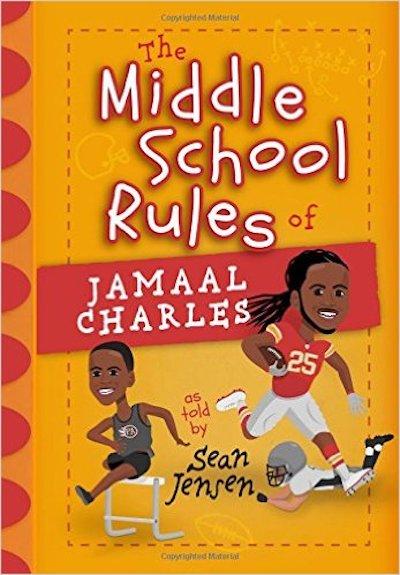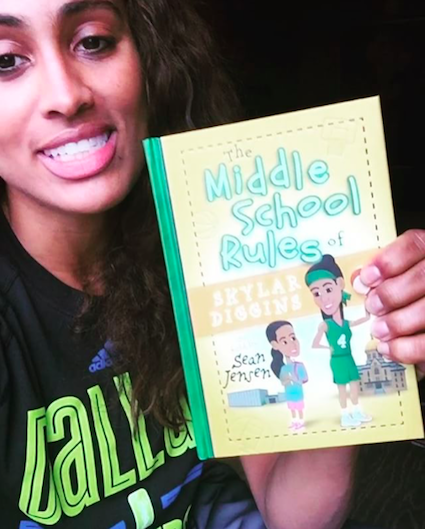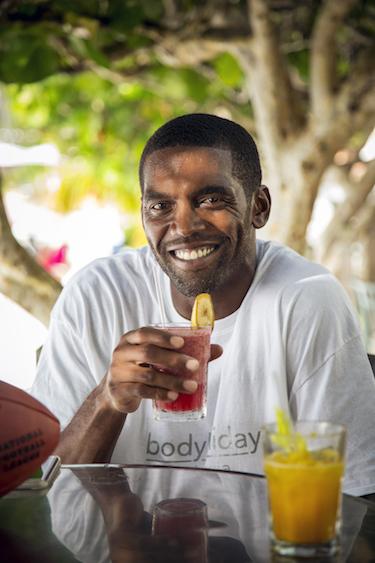Sean Jensen is the creator and author of the "Middle School Rules" book series aimed at youth readers. Each book has a prominent athlete telling meaningful stories and passing along valuable lessons he or she learned while growing up. The fourth and latest installment of "Middle School Rules" features NFL running back Jamaal Charles, who was bullied as a child because of a undiagnosed learning disability. Our conversation with Jensen -- who covered the NFL for the Chicago Sun-Times, St. Paul Pioneer Press and Milwaukee Journal Sentinel before launching his book career -- includes his road to becoming an author, how he connects with his own kids and some incisive analysis of why Randy Moss was often misunderstood.
ThePostGame: The "Middle School Rules" series is thriving with Jamaal Charles being the fourth title. This is such a great way to get youngsters who are sports fans into reading. How did the idea for the series start?
SEAN JENSEN: When my son Elijah was born, my wife and I tried to read to him every day. My wife is an avid reader and, well, I'm a writer! As he got to be 4 years old, though, I noticed he was drawn to books about boy characters that did mischievous things. A typical story: Naughty boy character is told not to do something, naughty boy character does it anyways, triggering a series of shenanigans. The naughty boy gets in mild trouble, the story ends. The next book is just a different misadventure. I felt such books negatively influenced my son, and I wondered what I -- as a writer -- could do to change that.
 I covered the NFL for 16 years, and I admired many of the remarkable stories of inspiration and overcoming adversity. Then I reflected on my childhood: I did not like to read the fictional books the school demanded I read, but I devoured biographies of all sorts of fascinating people. But I do recall some of those biographies were inappropriate for my elementary and middle school mind. So I dreamed: What if I could create a series that told the inspirational childhood stories of the athletes our children look up to?
I covered the NFL for 16 years, and I admired many of the remarkable stories of inspiration and overcoming adversity. Then I reflected on my childhood: I did not like to read the fictional books the school demanded I read, but I devoured biographies of all sorts of fascinating people. But I do recall some of those biographies were inappropriate for my elementary and middle school mind. So I dreamed: What if I could create a series that told the inspirational childhood stories of the athletes our children look up to?
TPG: Brian Urlacher was the subject of the first book. What was your hook when you pitched this idea to Urlacher?
JENSEN: Brian was an iconic Bears player, but he really didn't like to talk about himself -- ever. He would gladly speak about teammates, coaches or even opponents but not himself. So despite his popularity, there still seemed a lot of mystery about him. Over the course of three seasons, he respected not only my work but the way I worked. Before Christmas, I discovered that, each Christmas, he and his children would surprise kids from different community centers in disadvantaged neighborhoods in Chicago. He would throw them a pizza party and give them very generous Christmas gifts. When I approached him to ask him about that, Brian was taken aback. "How did you find out about that?" He pleaded with me not to write about it. His rationale? Because he didn't want the kids he was surprising to think he was doing it for the publicity. Brian was doing it because he remembers what it was like to struggle as a kid, growing up in a single-parent household with a mom who sometimes worked three jobs. And he wanted to instill in his children the importance of serving others.
Brian isn't the perfect person, and he'll be the first to admit it. But to me, that showed humanity and character. So after I developed the concept and secured a publisher, BroadStreet Publishing, I texted him and asked him to call me. I explained to him what I was doing -- inspiring kids through the real-life stories of athletes -- and why I wanted him to be my first athlete, alluding to that story I shared above. Without asking for particulars, Brian said, "Let's do it!"
TPG: What has been the most gratifying piece of feedback you've received on the series?
JENSEN: It always give me great joy whenever anyone posts a picture or shares some feedback about the books. But two things stand out: When I hear from parents who thank me because their child is a reluctant reader, yet he/ she powered through a MSR book. I recall one parent, an elementary school teacher, crying as she told me, "I've tried everything to get (son's name) to read, but I just couldn't. But when I gave him a copy of your book, he read it one sitting. Thank you!"
I also love when students tell me how a story from one of the books influenced them to do the right thing. There was a female middle schooler who read The Middle School Rules of Charles "Peanut" Tillman. In one chapter, Charles steps in when a neighborhood boy bullies his cousin. Encouraged by that chapter, the middle schooler intervened when two boys picked on a classmate who immigrated from another country. TPG: What were books that you loved reading as a kid? Any sports titles?
TPG: What were books that you loved reading as a kid? Any sports titles?
JENSEN: Again, I was drawn to biographies of people from all walks of life. I was a huge Larry Bird fan, so I remember reading Drive. As a boy, I delivered the Boston Globe, then, while at Northwestern University, I interned at the Boston Globe. On my final assignment of the summer, I was assigned to cover the Patriots preseason game in Green Bay. And, oh, I'd be traveling with Bob Ryan, the author of Drive and one of the great sports columnist of all time. Bob was so gracious and kind to me. But one of the books that jumps out in my mind is The Autobiography of Malcolm X, written by Alex Haley. I believe I was in fifth grade, and I would ride my bike to the library and check out books. One Saturday, I checked out Malcolm X's book. When I got home, I started reading it, and I couldn't put it down. I was captivated by his story. After a quick dinner break, I returned to reading the book, and I remember I didn't finish until like 3 a.m. The book was clearly inappropriate for me, but his story was so riveting, and Haley's writing so honest and powerful.
TPG: With the four athletes -- Charles, Urlacher, Charles Tillman and Skylar Diggins -- who have done "Middle School" books so far, is there a common trait you see in them, aside from sports prowess?
JENSEN: All four come from households, where the biological parents didn't stay together but they all were greatly supported by others, such as stepparents or grandparents, etc. Skylar, for instance, has a great relationship with her father and stepfather, who was her AAU coach. All four dealt with bullying. And all four are quick to highlight the teachers, coaches, neighbors, friends and countless others who imparted to them wisdom and contributed to them achieving a dream, not the dream. What I mean by that: They all understand that their success is more than lining their bank accounts. They understand that they have the influence to impact many, many others, in and outside of sports.
Look at Charles Tillman, who won the Walter Payton Man of the Year award because of the Cornerstone Foundation, which he and his wife run. It's blessed so many families. But Charles also speaks at schools, hospitals, conferences, sharing his story and encouraging others. I feel very privileged to work with such amazing people.
TPG: How has the process of writing these books made an impact on your outlook as a parent?
JENSEN: When I sign books for kids, I often write, "Show me your friends, and I'll show you your future." Many of the kids don't get it, but I hope it prompts a conversation with a parent. I think we have to be mindful about what we surround ourselves with, whether it's friends, or what music we listen to, what we watch on television, what we do in our free time. My wife and I were fortunate to go to a great college, but I don't believe that is the be all end all. Our goal for our children is to instill in them Christian values, of believing in Jesus Christ and honoring him by blessing others. Seeing that they -- my children -- are not the center of the world. We also understand that we must prepare them for the world, which means we can't keep them in a bubble and try to constantly micromanage their lives, solve their problems and blame others when things don't go their way. Most important, Brian, Skylar, Charles and Jamaal's parents reinforce that they were not perfect, but they surrounded each of them with a loving and encouraging community.
TPG: Bill Polian just said that Randy Moss and Terrell Owens should not be in the Hall of Fame, an opinion based largely on the premise that they were disruptive and difficult. You dealt with Moss during your years on the Vikings beat and came away with a much more favorable impression of him than what his reputation might suggest. Can you give some perspective on the perception and reality of Moss?
JENSEN: Perception: Randy Moss is a bad guy. Reality: He's not at all. People get hung up on a few things with Randy. He was moody, he was stubborn, and he had diva tendencies. But people judge him without really knowing him. One of Randy's issues is that he only cared what his family, friends, teammates and coaches thought about him. Reporters and fans? He couldn't care less, which of course hurt him because his unwillingness to be cooperative with the media paints a negative picture of him. I think that's a shame; I feel peers often judge a "good guy" based on how media-friendly he is. I think of one particular athlete who is positively characterized by the media, in part because of his accessibility, yet those close to him know many stories that do not reflect that image.
 Given his challenged childhood, Randy was, in my opinion, immature for his age. So many of his issues were, simply, antics. Too often, we paint people with such a broad brush. Good guy, bad guy. Good player, bad player. The reality is, we are all complicated. Like Brian, many of the generous things Randy did were never publicized. I remember writing this story of his friendship with a little girl. At the peak of popularity, Randy would shut out the world and make her feel special. I did some digging and came to find out that she had a rare disease. I spoke to the girl's dad, the Vikings head coach (Mike Tice) and star quarterback (Daunte Culpepper), who all provided great insight on that unique friendship. But when I approached Randy, he politely declined, saying something to the effect of, "Too personal."
Given his challenged childhood, Randy was, in my opinion, immature for his age. So many of his issues were, simply, antics. Too often, we paint people with such a broad brush. Good guy, bad guy. Good player, bad player. The reality is, we are all complicated. Like Brian, many of the generous things Randy did were never publicized. I remember writing this story of his friendship with a little girl. At the peak of popularity, Randy would shut out the world and make her feel special. I did some digging and came to find out that she had a rare disease. I spoke to the girl's dad, the Vikings head coach (Mike Tice) and star quarterback (Daunte Culpepper), who all provided great insight on that unique friendship. But when I approached Randy, he politely declined, saying something to the effect of, "Too personal."
For years, Randy would have an incentive for students in his hometown of Rand, West Virginia. If they got perfect attendance, he would take them on a trip to an amusement park several hours away. He'd pay for the buses, admission ticket, and he'd give all of them some spending cash. And he'd go with them. He never wanted any cameras there, and he refused to let anyone do a story. On the field, I'm not sure there's ever been a more physically gifted receiver. But I believe he didn't realize his full potential because of his front-runner mentality. In my opinion, Randy wasn't that impetus when his team was struggling. He too often let frustration get the best of him, most evident in him walking off the field against the Washington Redskins with a few ticks left in the game. But, overall, Randy was a great teammate. He did not care about his statistics. He cared about the W. If he caught three passes for 16 yards because he was double-covered but the team won, he was happy. But if he caught 10 passes for 200 yards and three touchdowns and the team lost, he'd be upset because he didn't have 15 catches for 250 yards in a victory. Hall of Famer? Absolutely. First-ballot Hall of Famer? No, I think that's reserved for a select few, and I don't think he quite deserves to be in that elite company.
TPG: When you speak with journalism students, is there a singular wacky moment from your career that you cite to help them get a better understanding of what this is all about?
JENSEN: Expect the unexpected. I don't know how many times I had to write two different stories, because, on a tight deadline, the game could swing either way in the final moments. That's one of the exhilarating aspects of being a journalist but also one of the most maddening.
TPG: For those who aren't familiar with your leadership role on the Asian American Journalists Association's Sports Task Force, why is this work particularly meaningful to you?
JENSEN: To paraphrase Luke 12:48: To whom much is given, much is expected. I have been wildly blessed in my life and career, but I know the challenges of being a journalist of color, particularly in the sports world. I feel duty-bound to help future generations of journalists. I mentor young journalists of all ethnicities and do what I can to encourage them and help them in their professional journey. It's been humbling to see how much the Sports Task Force has been able to accomplish in just two years. We provide scholarships and even recently announced an internship at ESPN. It's been such a joy to work with young talented journalists but also become friends with amazingly successful journalists who share a common goal of investing in our future. It's a challenging -- and scary -- time to be a journalist. But as I used to tell my students at the University of Minnesota, the tools and skills you learn as a journalist translate to many professions and fields. The art of storytelling never gets old.
TPG: Your bio on the book publisher's site mentions that you once ate 125 chicken wings at Buffalo Joe's while you were a college student at Northwestern. Just for some context, how long did that take and were they of the "suicide" intensity?
JENSEN: Ha ha. My fraternity had an event, and we had a bunch of wings left over. So, naturally, we had a wing-eating contest. We didn't have a time limit but focused on how many you could eat. I won handily. I'm guessing I ate that over the course of 80 minutes. They were not all suicide flavor but an assortment.





